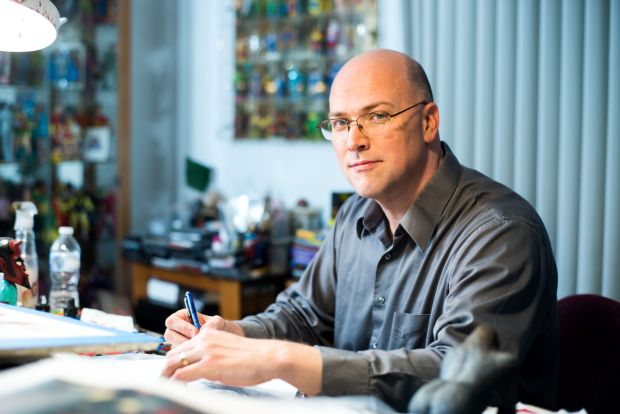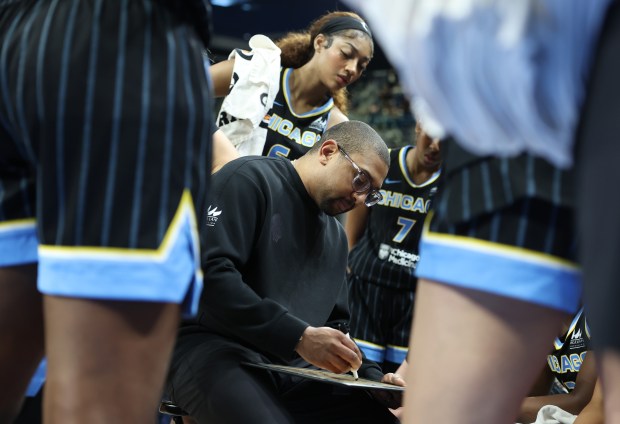Lawyers for four ex-ComEd executives and lobbyists convicted in a scheme to bribe then-House Speaker Michael Madigan argue in a new court filing that the entire prosecution was built on a “rotten foundation” and the charges should be dismissed in light of a key Supreme Court ruling in June.
The motion filed late Tuesday lays out in the starkest detail yet how defense attorneys for the so-called “ComEd Four” view the impact of the high court’s ruling in the bribery case of a former Indiana Mayor James Snyder, which said the federal bribery statute known as “666” does not criminalize “gratuities,” which are favors or gifts given to a public official without any agreement ahead of time to take some kind of official action.
“From the outset of this case, the government maintained that giving things of value to a powerful politician as a reward for past acts or to curry favor without a quid pro quo is criminal,” the ComEd Four defense teams argued in the motion. “On that foundation, the government built an edifice of overlapping charges. But as with all structures, if the foundation is rotten, the structure will fall. And in Snyder v. United States, the Supreme Court confirmed that the government’s theory has been rotten from the start.”
The ComEd Four defendants — former ComEd CEO Anne Pramaggiore; Madigan confidant and longtime lobbyist Michael McClain; internal ComEd lobbyist John Hooker; and consultant Jay Doherty — were convicted in May 2023 in an alleged scheme by the utility to funnel payments to Madigan-favored contractors in exchange for the longtime Democratic speaker’s influence over legislation in Springfield.
Since the case relied heavily on allegations of gratuities, sentencings have been delayed since January while the parties awaited the Snyder decision. Meanwhile, the judge who had presided over the trial, Harry Leinenweber, died in June at age 87, and the case has since been reassigned to U.S. District Judge Manish Shah.
The defense motion Tuesday said the prosecution’s theory of the case was wrongheaded from the get-go, including in the grand jury, where they told the panel it could indict the defendants on the conspiracy charge “based on the legal conduct of paying a gratuity.”
The new motion asked Shah to reverse the jury’s decision and acquit all four defendants — which would be an extremely rare move in any criminal case, let alone a high-profile public corruption prosecution. Alternatively, the defense has asked that the indictment be dismissed and the government forced to recharge the case under the new standard.
Prosecutors are scheduled to respond on Oct. 15.
Meanwhile, the same ComEd allegations form the backbone of the pending racketeering indictment of Madigan and McClain, which is set to go on trial on Oct. 7. Attorneys in that case are still hashing out what to do in light of the Supreme Court ruling, though both sides have said it should not delay the trial any further.
The motion does, however, offer a preview of what likely will be a key portion of Madigan’s defense: that there was never any agreed upon quid pro quo to help ComEd with its legislative goals.
The motion argued that even after years of investigation, hundreds of hours of wiretapped calls and the assistance of a key insider, then-ComEd Vice President Fidel Marquez, who secretly recorded his own colleagues talking about the plan, the evidence amounted to nothing more than a business seeking to “curry favor” with a powerful politician in the hopes it would help their bottom line — an everyday occurrence in politics that the Supreme Court has said is not illegal.
“The government could not come up with anything more than that Speaker Madigan had power, everyone knew it, and regulated entities like ComEd responded to that power,” the motion stated.
Even prosecutors’ own cooperator, Marquez, testified at trial he did not believe ComEd was doing favors for Madigan “in exchange for any official acts by him,” the motion said.
As the government’s star witness, Marquez testified in March 2023 that the roster of “subcontractors” hired by ComEd was curated by McClain and read like a who’s who of Madigan’s vaunted political operation, including two legendary precinct captains, a former assistant majority leader in the House and two former Chicago alderman at the center of Madigan’s Southwest Side base of power.
Over the course of eight years, ComEd paid them hundreds of thousands of dollars, even though they had no particular expertise and ultimately did virtually no work for the utility. Some seemed to be downright incompetent, Marquez told the jury.
“I know that they were brought on as a favor to Michael Madigan,” Marquez testified on direct examination. “For Madigan to see ComEd positively. So that he could perhaps be helpful for our legislative agenda in Springfield.”
On cross-examination, Marquez, who pleaded guilty to bribery conspiracy and is awaiting sentencing, acknowledged that there was “no guarantee” that Madigan was going to help pass ComEd bills, but added that the company still tried to make him happy because “not doing it would cause us to be negatively looked on by” the speaker.
He also admitted that he initially told the FBI he didn’t believe any of it was bribery.
“You did not believe that ComEd had bribed Mike Madigan, did you?” Pramaggiore attorney Scott Lassar asked.
“Correct,” Marquez answered.
The defense motion Tuesday said Marquez’s testimony showed he was motivated by “his own personal fear of retaliation” by Madigan rather than any promises to help ComEd’s agenda.
“Mr. Marquez’s well-prepared testimony leaves no doubt that there was no offer or agreement that Mr. Madigan would take any official acts in exchange for ComEd’s acceptance of his recommendations,” the motion stated.
After the Supreme Court’s decision in Snyder in June, Lassar, a former U.S. attorney, told the Tribune that in his view, the ComEd convictions will not stand.
“The Supreme Court has made clear that what Anne Pramaggiore was charged with was not a crime,” Lassar said.
In the high court’s 6-3 ruling, which has been highly anticipated in Chicago’s federal court, the justices agreed that the anti-corruption law under which Snyder was convicted is vague and could potentially criminalize innocent, everyday conduct.
Madigan’s attorneys filed a motion in July arguing that that 14 of the 23 counts of the indictment are “fatally infirm” and should be dismissed, in part because there is no proof that the once-powerful leader agreed to use his official position for personal gain.
The motion argued that the prosecutors, in their “highly publicized, lengthy speaking indictment,” failed to allege facts “that would support the notion that Madigan acted corruptly or agreed to, or intended to agree to, a quid pro quo.”
In response, prosecutors argued there is plenty of evidence Madigan engaged in a long-running conspiracy to enrich himself, including standard quid-pro-quo bribery, not just isolated instances of corrupt gratuities.
The Supreme Court’s decision does not affect prosecutions “that target schemes that involve a stream of benefits over time that are offered or received for official action,” according to the U.S. attorney’s office.
Prosecutors also brushed off the extensive pretrial filings as an attempt by Madigan and McClain “to prevent a jury from considering their conduct and holding them accountable for their gross abuses of power.”
jmeisner@chicagotribune.com




